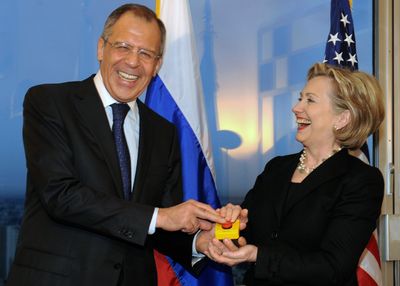Clinton, Russian official: Common ground possible

GENEVA – Russia and the United States may be able to reach common ground on the key issues of missile defense and nuclear weapons reductions, Russian Foreign Minister Sergei Lavrov and U.S. Secretary of State Hillary Rodham Clinton said Friday.
Lavrov and Clinton spoke positively, if cautiously, after meeting in an effort to ease lingering tensions between the two countries.
“We did not agree on everything, of course, but we agreed to work on every issue,” said Lavrov. “I think we can arrive on a common view both in the context of offensive strategic weapons, and missile defense.”
Clinton described the meeting as “a fresh start.” Repairing relations with Russia has been high on the Obama administration’s agenda because of Russia’s potential leverage on issues pertaining to Iran’s nuclear program, Afghanistan, Mideast peace, and security in Eastern Europe. Ties between the two countries have been strained since last year’s Russian military incursion into Georgia.
Friday’s session was the highest-level meeting yet between the administration of President Barack Obama and the Russians. There were hints that Clinton’s dealings with Lavrov could be tense, recalling the Russian official’s strains with former Secretary of State Condoleezza Rice.
Lavrov bristled when reminded by a reporter at a news conference of American efforts to persuade Moscow not to sell long-range, surface-to-air missiles to Iran.
The missiles would substantially improve Iran’s defensive capabilities, and U.S. and Israeli officials have strongly lobbied Russia not to sell the equipment.
Lavrov insisted that the missiles were “nondestabilizing, defensive weapons” and then issued what appeared to be a criticism of the United States for selling arms to the Georgian government.